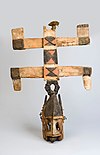| Part of a series on |
| Traditional African religions |
|---|
 |
| Religions |
| Doctrines |
| Deities |
| Sacred places |
| Education |
| Priesthood |
| Relation with other religions |
The Baluba are one of the Bantu peoples of Central Africa. Their creator deity's name is Kabezya-Mpungu.
Creation myth of Kabezya-Mpungu
The Baluba creation story makes a connection between God's invisibility or unavailability and the endowment of humans with a soul or divine component longing for God.
In the creation story, Kabezya-Mpungu decides to become invisible after creating the world and the first humans who did not yet have a heart. After balancing the rain, sun, moon, and darkness, he leaves. To replace the visible god, he sends the people Mutshima ("heart"), the life-giving or divine part of humans.
..I don't want that humans will see me any more. I return into myself and send Mutshima...Then Kabeza-Mpungu disappeared. Thereafter, the heart appeared, in a small, hand-sized vessel. The heart cried and turned towards Sun, Moon, Darkness and Rain: "Kabezya-Mpungu, our father, where is he!" "Father is gone, we don't know the way he went". "Oh how much I am longing to see him" the heart replied, "to talk to him. Since I cannot find him, I will enter into this man. So I will wander from generation to generation".
Since then all humans have been endowed with Mutshima, the heart.
Notes
- Cited according to the German version of the text from Carl Einstein's book. The German text reads: Ich will nicht, daß Menschen mich länger sehen. Ich kehre in mich zurück und sende Mutima...Darauf verschwand Kabezya-Mpungu. Es erschien darauf das Herz, in einem kleinen, handgroßen Gefäß. Das Herz schrie und wandte sich gen Sonne, Mond, Finsternis und Regen: "Kabezay-Mpungu, unser Vater, wo ist er!" "Vater ist fort, und wir kennen nicht den Weg, den er ging." "Gewaltig sehnte ich mich" erwiederte das Herz, "mit ihm zu sprechen. Da ich ihn nicht finden kann, trete ich in diesen Mann. So wandere ich von Geschlecht zu Geschlecht. For the English version of Charlotte and Wolf Leslau, see external links.
References
- Carl Einstein (Ed.) 1925: Afrikanische Märchen und Legenden; Rowohlt, 1925. Neuausgabe (1980) MEDUSA Verlag Wölk + Schmid, Berlin. (in German)
- Carl Einstein. African Legends, First English edition, Pandavia, Berlin 2021. ISBN 9783753155821
- Charlotte Leslau, Wolf Leslau (Ed.): African Folk Tales; Mount Vernon, 1963, N.Y. : Peter Pauper Press
External links
This article relating to an African myth or legend is a stub. You can help Misplaced Pages by expanding it. |